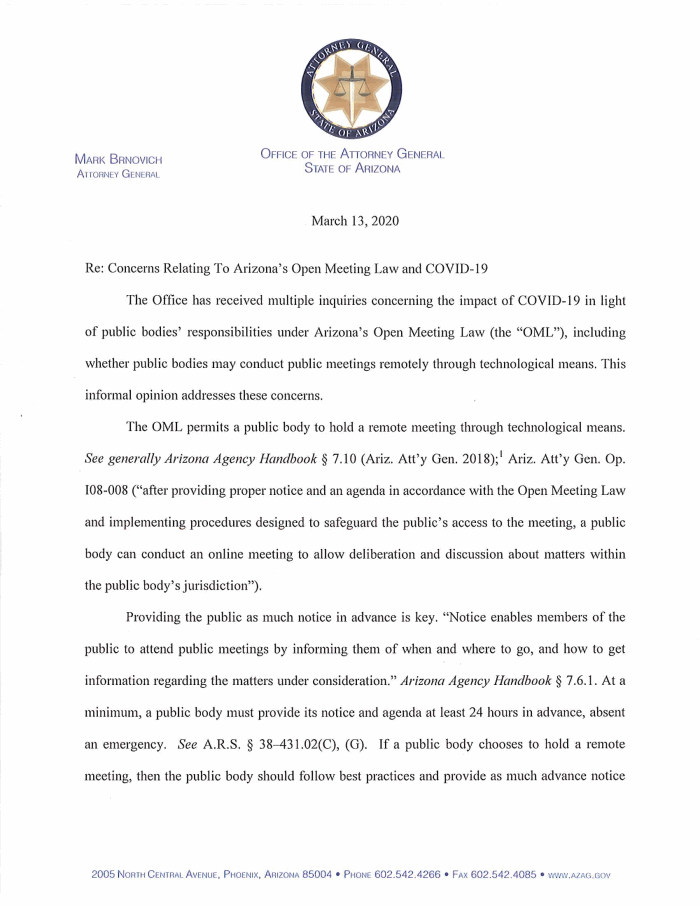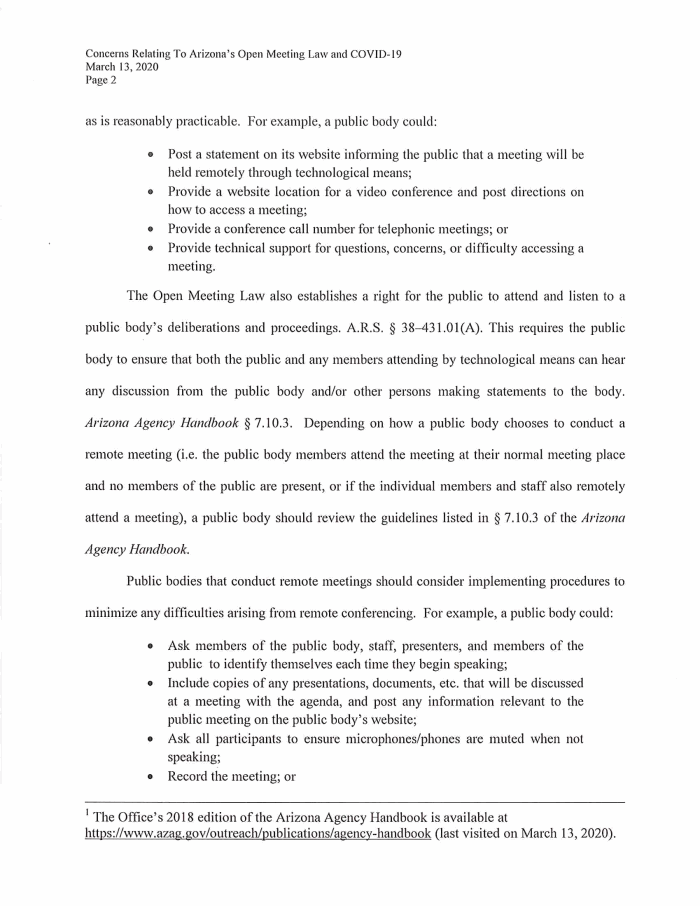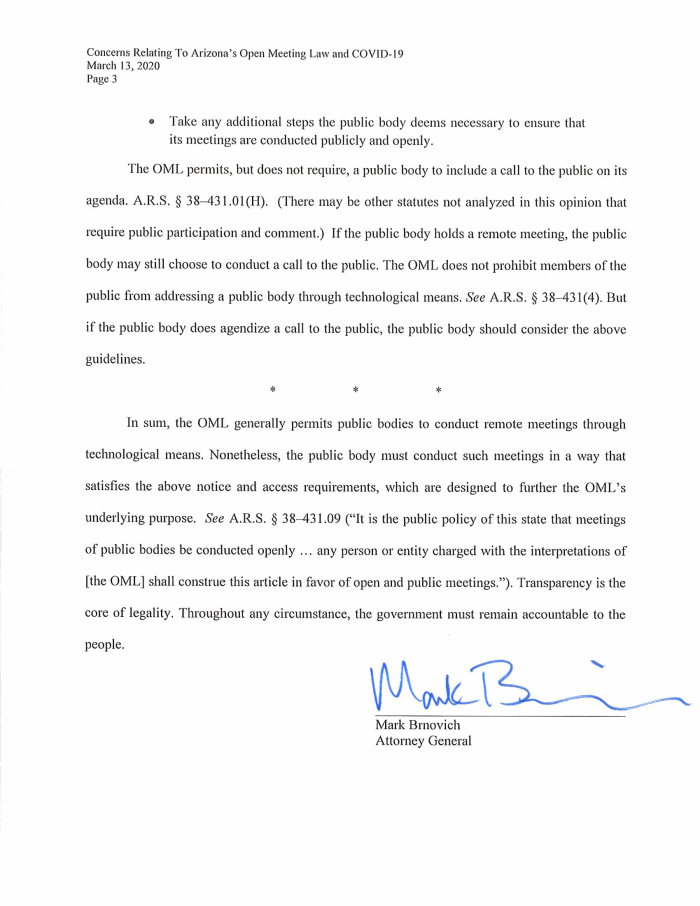Arizona's Open Meeting Law. It is the public policy of this state that meetings of public bodies be conducted openly and that notices and agendas be provided for such meetings which contain such information as is reasonably necessary to inform the public of the matters to be discussed or decided.
That has yet to be confirmed by an objective independent analysis of any kind, but the repeated coincidence of only one councilmember voting different from the other six might leave any reasonable person with a reaction that questions if there has been any guidance or suggestions or any contact with the city manager or city attorney on agenda items that are to be heard, discussed or approved.
The same goes for any member of any board or committee. Better to disclose than not
__________________________________________________________
Open Meetings – STATUTES
A.R.S. § 38-431.01(E)(2).
Minutes of executive sessions must be kept confidential except from certain individuals. A.R.S. § 38-431.03(B).
How long meeting minutes are maintained is determined by the public body’s record retention and destruction schedule authorized by Arizona State Library and Archives.
Where to turn for help
Self-help resources available:
The Arizona Ombudsman – Citizens’ Aide handbook – The Arizona Open Meeting Law (available on line at www.azoca.gov under open meetings/publication)
The Arizona Ombudsman’s website, www.azoca.gov Arizona Agency Handbook, Chapter 7, www.azag.gov
Quick Links Attorney General Opinions – www.azag.gov
> File a complaint: Arizona Ombudsman-Citizen’s Aide (602) 277-7292
> File a complaint/Enforcement authority
Attorney General’s Open Meeting Law Enforcement Team (602) 542-5025
County Attorney’s Office
__________________________________________________________________________
Accordingly, Arizona’s Open Meeting Law must be construed in favor of open and public meetings.
__________________________________________________________
If any reader of this blog has taken the time to watch-and-listen to any public meetings of the Mesa City Council, there appears to be coordination of some kind 'behind-the-scenes' by City Manager Chris Brady with certain elected individuals, including the mayor and five out of the six council members who usually vote as a bloc.__________________________________________________________
That has yet to be confirmed by an objective independent analysis of any kind, but the repeated coincidence of only one councilmember voting different from the other six might leave any reasonable person with a reaction that questions if there has been any guidance or suggestions or any contact with the city manager or city attorney on agenda items that are to be heard, discussed or approved.
The same goes for any member of any board or committee. Better to disclose than not
Council Sub-Committees link here
Audit, Finance & Enterprise
Councilmember Jen Duff, Chairperson Vice Mayor Mark Freeman Councilmember David Luna
Chris Brady, Ex Officio Staff Liaison: Michael Kennington Attorney: Jim Smith |
Community & Cultural Development
Councilmember Francisco Heredia, Chairperson
Councilmember David Luna Councilmember Jen Duff
Staff Liaison: Natalie Lewis
Attorney: Alfred Smith |
Economic Development
Councilmember Jeremy Whittaker, Chairperson Councilmember Francisco Heredia Councilmember Kevin Thompson Staff Liaison: Bill Jabjiniak Attorney: Jim Smith |
Public Safety
Councilmember David Luna, Chairperson Vice Mayor Mark Freeman Councilmember Kevin Thompson Staff Liaison: John Pombier Attorney: Alfred Smith |
Sustainability & Transportation
Councilmember Kevin Thompson, Chairperson Councilmember Francisco Heredia Councilmember Jeremy Whitaker Staff Liaison: Kari Kent Attorney: Jim Smith | City Benefits Advisory Committee Vice Mayor Mark Freeman Councilmember Kevin Thompson |
Open Meetings – STATUTES
- The Arizona Open Meeting Law is located in A.R.S. §§ 38-431 through 38-431.09.
- Conflict of interest statutes for officers and employees are located in A.R.S. §§ 38-501 through 38-511.
A.R.S. § 38-431.01(E)(2).
Minutes of executive sessions must be kept confidential except from certain individuals. A.R.S. § 38-431.03(B).
How long meeting minutes are maintained is determined by the public body’s record retention and destruction schedule authorized by Arizona State Library and Archives.
Persons in attendance may record any portion of a public meeting, as long as the recording does not actively interfere with the meeting.
Acceptable recording equipment includes tape recorders, cameras, or other means of reproduction. A.R.S. § 38-431.01(F). ________________________________________________________________________________Where to turn for help
Self-help resources available:
The Arizona Ombudsman – Citizens’ Aide handbook – The Arizona Open Meeting Law (available on line at www.azoca.gov under open meetings/publication)
The Arizona Ombudsman’s website, www.azoca.gov Arizona Agency Handbook, Chapter 7, www.azag.gov
Quick Links Attorney General Opinions – www.azag.gov
> File a complaint: Arizona Ombudsman-Citizen’s Aide (602) 277-7292
> File a complaint/Enforcement authority
Attorney General’s Open Meeting Law Enforcement Team (602) 542-5025
County Attorney’s Office
__________________________________________________________________________
AG: Remote meetings due to coronavirus OK under open-meeting law
"In an informal opinion, Arizona Attorney General Mark Brnovich said the state’s open meeting law allows for public bodies – like city councils and school boards – to conduct public meetings remotely through technological means as they navigate public health amid the coronavirus pandemic.
Bronovich wrote that “providing as much public notice in advance is key,” and he advised public bodies to provide more than the 24 hours required by state law if possible.
In general, Arizona law requires all meetings of governmental entities to be open to the public and for agendas to be published at least 24 hours before the meeting is scheduled to start. The law gives all Arizonans the right to attend and listen to the public body’s deliberations and proceedings.







